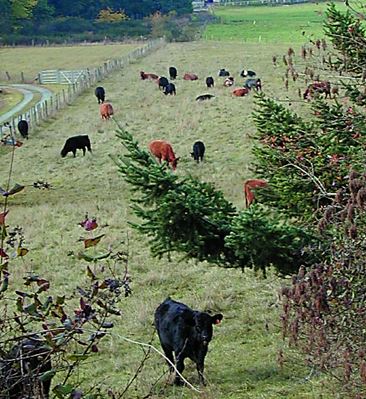Forage
Rangeland is land that supports vegetation consumed by livestock or wildlife, that is managed as a natural ecosystem. B.C.'s private and Crown rangelands span the province and encompass ecosystems including alpine, subalpine, community pastures, forestlands (logged or not), grasslands, parklands, shrub lands, riparian areas (wetlands and rivers).
B.C. rangelands include dense coniferous forests, open coniferous forests maintained by fire, dry valley bottoms with bunchgrasses, moist/wet meadows, hardwood forests, mixed prairie, and alpine environments. These forage areas present unique management challenges. About 80 percent of rangeland in B.C. is on Crown land. The rest is privately owned.
Types of rangeland ecosystems
Rangeland refers to any land supporting vegetation that can be consumed by domestic livestock and wildlife, and is managed as a natural ecosystem. Rangelands are located throughout most of British Columbia and include:
- Alpine
- Community pastures
- Forestlands (logged and unlogged)
- Grasslands
- Parkland
- Shrub lands
- Subalpine
- Riparian areas (wetlands and rivers)
- Private and Crown Rangelands
- Rangelands are either owned privately or by the Crown and are managed to supply forage for both livestock and wildlife
Access to crown forage
Government supports the economic viability of existing ranching operations in British Columbia by ensuring continued access to Crown land for grazing and haycutting. The province manages Crown range resources through tenures issued under the Range Act or the Land Act.
Range Act:
Grazing and hay-cutting tenures are issued under the Range Act as either licences (15-25 year terms) or permits (up to 10-year terms).
Land Act:
Grazing leases have traditionally been issued under the Land Act as 20-year tenures. Applications for new grazing leases are no longer available but existing grazing leases can be renewed upon application.
Pasture and range health
Pasture and range health depend on the maintenance and balance of the soil, vegetation, water and air, as well as the ecological processes of the grazing land ecosystem.
Grazing management
When developing a grazing management plan it’s important to consider grazing frequency and usage of every pasture in your grazing rotation.
Drought management

Rangeland is land that supports vegetation consumed by livestock or wildlife.
Related links
Contact information
Contact your Natural Resource District and Range Officer if you have questions about rangeland use in a specific Natural Resource District. Please direct general questions to:
Forests.RangeBranch@gov.bc.ca
Range.GrazingLeases@gov.bc.ca
Invasive.Plants@gov.bc.ca
Range.Practices@gov.bc.ca
Range.GrazingPolicy@gov.bc.ca
